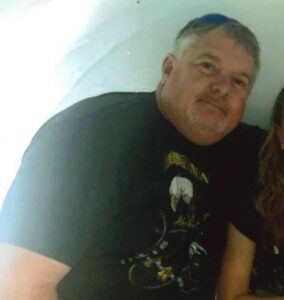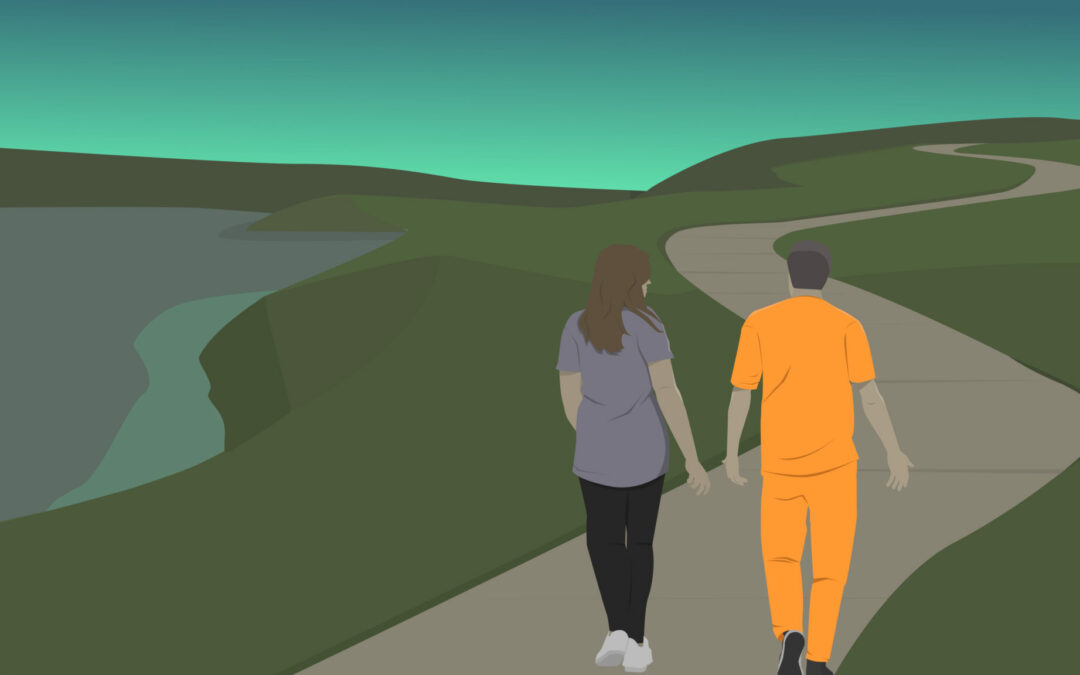Sean’s first recollection of God’s presence came when he was a small child. He was hiding alone behind his family’s couch after a beating from his father.
“I was bleeding and crying, and a shape and a voice came to me telling me to calm down and teaching me to breathe and relax and how to stop the bleeding,” Sean wrote to us recently in a letter. “I really believe this was an angel because there was no person there. My parents had gone to their room, and I was left alone to deal with my broken body.”

Sean’s grandmother became his flesh-and-blood angel once she discovered the abuse occurring in Sean’s home. She took in Sean when his parents abandoned him, and while she never reported the abuse in Sean’s home, Sean credits her with saving his life. She was a supportive presence for him for many years, and he attended church with her when he was a teenager. She was with him when, in his late teens, he lost his first true love and their unborn child in a car crash. She was there for him when he spent nine months recovering from injuries he sustained in Kuwait while he was serving in the Navy in Operation Desert Storm. She held on to life during her final days in a Washington hospital until Sean could reach her. He was holding her hand when she died.
While his grandmother was a positive presence in his life over the years, substance abuse was a destructive presence. Sean turned to alcohol in earnest after his grandmother died, and the alcohol abuse put an end to his marriage. His marriage was rocky long before his grandmother’s death because of his untreated post-traumatic stress disorder and addiction to prescription painkillers. He later traded his addiction to substances for an addiction to pornography, which led to a prison sentence in 2020.
Life stories like Sean’s can be difficult to digest, yet they are tragically common among incarcerated individuals. A US Department of Justice study of incarcerated men in New York found that roughly one in three had endured severe physical abuse as children. In addition, it is highly likely that any given Crossroads student has experienced substance abuse. Federal statistics indicate that up to 85 percent of incarcerated men and women have experienced substance abuse.
Sometimes the pain of past abuse and addiction comes through in students’ lessons. They share their past hurts because they feel safe with our mentors. They know they are accepted and loved, many of them for the first time in their lives.
When a student lesson contains difficult topics, a Crossroads staff member or volunteer inserts a note to alert the mentor about the content. Mentors can opt not to receive lessons with difficult topics like child abuse if they feel unequipped. Some mentors request to receive the lessons with challenging topics because they have professional backgrounds or life experiences that help them relate to these students.
Crossroads is working to identify mentors with personal or professional experience that can help them skillfully and sympathetically respond to students who share accounts of abuse, neglect, addiction, mental illness, or other challenges. If a student conveys suicidal thoughts, Crossroads notifies the correctional facility immediately to make sure the student gets the professional help they need.
Please contact our mentor support team if you have expertise that could be of special help for students. We are identifying mentors who are comfortable responding to student comments about tough personal topics. We would also like to identify more mentors who are equipped to deal with thorny theological questions. Last, we would like to know if you can support students who struggle with literacy or who are learning to read and write in English. It is our goal to remove barriers to student learning by matching them with the right mentors.
We can joyfully share that Sean has been sober for three years, and he told us he has developed a strong friendship with someone in his facility who is a “baby Christian” and attends Bible studies and church services with Sean. Sean has grown by leaps and bounds in realizing his need for forgiveness for his crimes and his need to forgive those who abused him as a child. He hopes his life can be an inspiration.
“It’s my hope that anyone who has the chance to read this is able and willing to forgive those who hurt them and ask for God’s forgiveness. And if you are a child and in harm’s way, please, please tell someone you trust and get help before you end up in prison or dead,” Sean wrote.
If you are a mentor who feels equipped to respond to students who have challenging questions and comments, please contact [email protected]. If you would like to sign up to become a mentor, please visit our website.
For information and resources on domestic violence, substance abuse, and mental health services, visit the National Domestic Violence Hotline and SAMHSA’s National Helpline.


